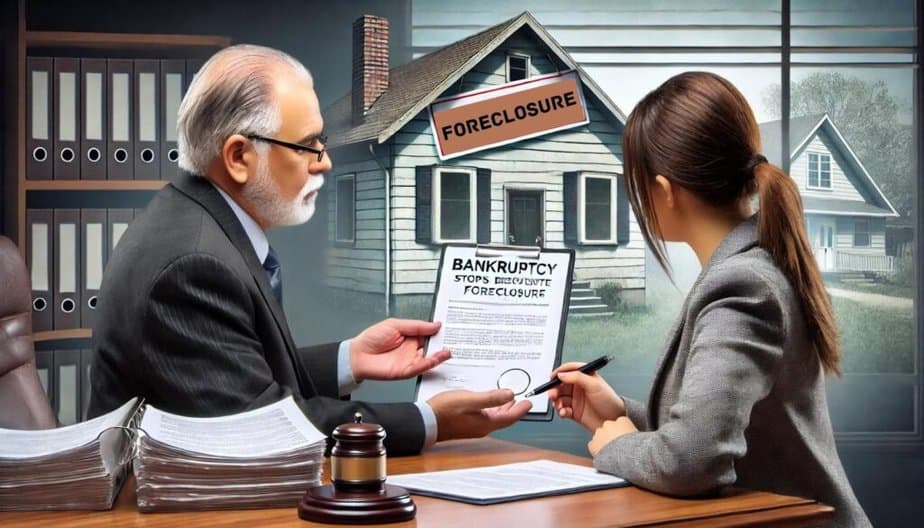Find Out To Stop Home Foreclosure Proceedings
Foreclosure can be stopped by bankruptcy. When a person who owns a home loses money and falls short in mortgage payments, he or she may lose the house any time soon. Bankruptcy presents an opportunity for one to legally stop these processes and get their finances back on track.
Different types of bankruptcy including chapter seven or chapter thirteen come with their advantages when it comes to preventing foreclosure. By declaring bankruptcy under Chapter Seven people may get immediate respite from repayment requirements while some debts are written off altogether.
It is therefore important for homeowners to understand these alternatives before deciding on anything.
Homeowners who are thinking about whether or not to declare themselves bankrupt should seek advice from an experienced insolvency lawyer.
This article offers detailed information on how bankruptcy can be used as a way to prevent foreclosures.
Understanding the Foreclosure Process
When a homeowner does not pay the mortgage, then foreclosure becomes necessary, which means repossessing the loan by the lender.
It starts with the home loans company instituting legal suits so as to get back its ownership over a house.
However, there are many procedural differences depending on varying state laws whereby some states insist that a court has to be involved in these actions while others do not require this process to go through court.
In legal foreclosure, the moneylender sues the debtor and follows up through the judiciary system. prior to the disposal of property, this is likely to be protracted and a judicial foreclosure involves various legal procedures associated with it. On the other hand Non-judicial foreclosures do not depend on court rulings instead they follow specific steps laid down during lending agreements or stipulated in state laws.
It will come a time after meeting all legal prerequisites for foreclosing when there is scheduled sale of property by a lender or through transfer to another person.
It’s important for anyone facing such a situation to understand why this happens as well as other alternatives that may help avoid loss of his residence.
Foreclosure Sale

A foreclosure sale may be defined as an event in which the real estate that has been repossessed is disposed of through competitive bidding.
This process is normally carried out after the borrower has fallen behind with the mortgage payments leading to completion of the bankruptcy legal measures by the financial institution awarded him/her the money.
Foreclosure sales serve the purpose of enabling the lender to recover part or all of his/her invested funds through auctioning out such properties.
In the event of a foreclosure sale, bidders are invited to make offers on a piece of property. Usually, the highest bidder is declared the winner at a price that is less than what similar properties in the same neighborhood may fetch.
This way, buyers could take advantage of buying houses at cut-prices only if thorough checks are conducted so as to ascertain their condition status as well as any existing encumbrances.
Amongst others one may encounter risks such as possible repairs needed or pending legal matters.
Consulting a realtor or lawyer can help a would-be buyer navigate through the maze surrounding foreclosures while still ensuring that there is successful completion of any payment transaction.
How Bankruptcy Can Help

When the foreclosure has started on your property, you may be able to stop it by filing bankruptcy as a way of gaining more time to consider other options. An immediate halt will be placed on all collection activities including going ahead with foreclosure proceedings once the individual who owns a home goes bankrupt.
It is only after this period of grace that one can be able to assess his financial position and decide on what should be done so as to retain ownership rights over his residential premises.
Both Chapter seven and Chapter thirteen bankruptcies can help people who are facing financial difficulties avoid losing their homes through foreclosures.
This could create surplus income which may then be used towards making payment for the current mortgage payments, without accumulating more debt that would normally come with it such as through chapter seventeen bankruptcy where one pays only what they can afford until every last coin has been settled.
Bankruptcy Chapters and Foreclosure
There are situations when applying for bankruptcy is the only way to delay the foreclosure process till things are put in place for the affected persons.
Consequently, questions regarding whether a filing for chapter 7 bankruptcy stops foreclosure or simply delays it have been lingering over the years.
This article will answer this question once and for all by providing relevant information on what chapter 7 bankruptcy is all about and what it does in relation to foreclosure.
Would you like to know if chapter 7 bankruptcy stops foreclosure? Here is an answer that will not disappoint you; yes, chapter 7 bankruptcy does indeed stop all foreclosures. The thing is, most of us do not understand how exactly it works.
The truth is chapter 7 bankruptcy actually prevents foreclosure by giving the court an opportunity to review finances of a debtor who is undergoing financial hardship.
In conclusion, chapter 7 bankruptcy can delay foreclosure, but not prevent it. Rather than that, it provides temporary debt relief, through the automatic stay which puts a halt to foreclosure proceedings.
This gives homeowners time to eliminate the unsecured debts that will enable them to use some extra cash to settle the mortgage arrears. Nonetheless, without a repayment plan chapter 7 does not offer a permanent solution to keeping your home.
Chapter 13 Bankruptcy and Mortgage Payments

Under a Chapter 13 bankruptcy filing, the debtor is given an opportunity to pay off some of his/her debts in parts within a specific period. It is the responsibility of a bankruptcy trustee to make sure that this payment plan is adhered to by ensuring payment is made as scheduled in accordance with the bankruptcy court already-approved plan.
This implies that the structured nature of Chapter 13 helps debtors plan their money more effectively.
The presence of a bankruptcy trustee ensures that this procedure is being watched while enabling debtors to protect their houses through its implementation.
Otherwise, Through this way, there is no way debtors would make up for any missed mortgage payment and stop foreclosure from taking place. The trustee is a key person in the orderly management of the repayment process and ascertains that everybody is doing what they are supposed to.
Chapter 13 also eradicates the second or third mortgages or home equity lines of credit.
This form of operation is referred to as ‘lien stripping’ which allows a debtor to consider junior mortgages under an unsecured status that can be wiped clean through bankruptcy.
To avoid foreclosure or other noncompliance with court directives, debtors are required to keep on making monthly mortgage payments as well as sending their repayment plan monies to the lender.
The Automatic Stay and Foreclosure Proceedings

The automatic stay is an important provision in bankruptcy law that prohibits collection by creditors.
When a debtor files for bankruptcy, the automatic stay brings all foreclosure proceedings to a grinding halt as a temporary measure to prevent the loss of property. This measure gives debtors an opportunity to rehabilitate their finances within a given window.
Filing bankruptcy can stop a foreclosure proceeding including a scheduled foreclosure sale.
At once, the sale of the house stops giving time for the debtor to file bankruptcy and try other options to prevent loss. This means that all creditors are barred from enforcing any claim during the period of operations under bankruptcy.
But it is important to realize what will happen in future after obtaining relief from foreclosure through this method. A lender can attach a motion for relief from automatic stay subpoenaing court permission to proceed with foreclosure. Hence, it is significant for debtors in such situations to engage closely with their insolvency advocates so as formulate a concrete plan on how they would pay off the mortgage arrears and avoid going into receivership.
Filing for Bankruptcy After a Foreclosure Judgment

One can be relieved of debt upon declaring bankruptcy subsequent to a foreclosure decree. However, filing for bankruptcy even if the foreclosure process has reached the stage of judgment, might still be highly advantageous. It stops further collections thereby creating a possible route to getting rid of any remaining debts which may include deficiency judgments.
A fresh start may be bought by filing a bankruptcy that cancels out deficiency judgments. When someone is not able to pay their mortgage, a deficiency judgment is issued against them which means they still owe money on the home loan even after it has been foreclosed on. The main aim for filing bankruptcy would be therefore to clear off this remaining debt hence relieving the debtor from its financial burden.
Nevertheless, individuals must comprehend the bankruptcy legislation and how it interacts with foreclosure procedures. A lawyer dealing with bankruptcy can help them explore this option whereby they would make better decisions.
This way they will be in a position to choose the most optimal alternative and take measures to control it through their lives with respect to their financial security.
Bankruptcy and Home Equity

The property a person owns which can be affected by insolvency second or third mortgage only, is bankruptcy. The equity might be high enough because of which house sales occur in chapter 7 insolvency. Therefore, in the process of liquidating assets to pay off what is owed, that means people who have a lot of money invested in their houses could lose them.
By putting it into their repayment plan, homeowners sometimes preserve some part of their home equity when they file for bankruptcy under 13th chapter. This method enables debtors to retain ownership and on top of it clear all obligations slowly over an agreed upon period. Through developing an installment schedule debtors are enabled to take charge over their finances without having to part ways with their dear capital items.
For property owners who wish to shield their investments against insolvency dangers, it is important to understand what this means house prices going down. For them to navigate through these issues, they must seek advice from an insolvency lawyer.
In relation to homeowner equity in such cases a counsel would offer you personalized advice pertaining to exactly where you stand in terms of your own money matters.
Alternatives to Bankruptcy
For homeowners facing foreclosure, they must consider other ways apart from bankruptcy.
This way, they can be assisted without necessarily having to declare themselves bankrupt:
- Loan modifications
- Refinancing
- Negotiating with the lender
- Short sale
- Loan forbearance
Homeowners can manage their mortgage repayments better by considering these other options.
Each one of them has its own advantages as well as some disadvantages you need to be aware of when making decisions on them or seeking help from an expert who understands these matters.
The Role of a Bankruptcy Attorney

The role of a bankruptcy attorney is important in the insolvency process; helping people who are at risk of losing their property up to date with new legislations. Legal representatives play a supportive role when property owners have to make critical decisions on how best they can protect their assets.
Filling of legal papers and taking clientele to the bankruptcy courts and tribunals are the main jobs of bankruptcy attorneys. Their main task is making sure that the clients’ due Justice is done in all respects whenever they appear in court, or when mediation talks are going on with creditors. Therefore, having an attorney present during such processes is what could help one have a positive outcome in a bankruptcy proceeding.
Meeting a bankruptcy attorney in times of such confusion and stress will always help dispel fears as well as provide information that one needs concerning his or her situation In regards to finance. The guidelines issued by these persons pertain to financial status vis-à-vis law’ they act as a reference through which an individual may revisit whenever there is need be to enable him/her to sort out issues along the lines of clean slate with money.
For anyone who wants Stop Their home from being taken over by the bank but still Clear Debts About towns without one foreclosing again, getting assistance from an accomplished attorney cannot be overstressed.
Conclusion
Bankruptcy is a powerful tool that can be used to stop foreclosure and give the homeowner a fresh start financially. The foreclosure and bankruptcy process, and the ways in which bankruptcy can be used are very important.They should understand these things if they are to make informed decisions.
For instance, declaring with Chapter 7 or 13 lets one break foreclosure so as also to make a plan that caters for an unpaid mortgage and any other debt.
Firstly, bankruptcy law’s automatic stay provision gives the homeowners instant pause from foreclosure which allows them to get their finances in order. In order not get lost in these complicated processes one should hire good bankruptcy attorneys all along.
Thus this will give more alternatives rather than going for bankruptcy alone considering the House Equity role in it paving way to other possibilities for securing one’s future financial standing.





























